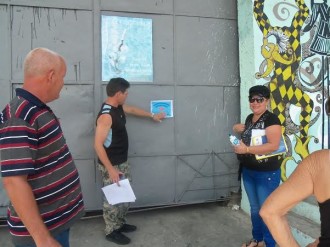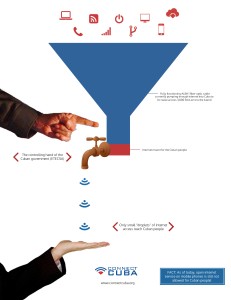An article on June 30th from El Nuevo Herald as well as the follow-up in Newsweek on July 13th highlights recent Cuban government meetings with several Google executives on the possibilities of bringing massive Internet to Cuba. Brett Pelmutter, a top Google Ideas exec, reportedly presented a plan to provide internet to Cuba via Wi-Fi connections directly to mobile devices. It is a similar strategy implemented by the tech giants Google and Facebook in emerging African nations. The concept of jumping to mobile infrastructure has been touted to be more cost effective to implement than hard wiring an entire nation or going through outdated ADSL technology, as was for Cuban homes in the not too distant future, but then quickly denied by ETECSA officials, Cuba’s state owned telecom monopoly.
G
The prospect of open, uncensored access to the world wide web, or as local Cubans refer to it “la red de redes (the network of networks),” apparently has top Cuban government officials rattled. Alana Tumino, director of of the work group on Cuba in Americas Society and Council of the Americas (AS-COA), believes “there is still skepticism among Cuban officials about the reasons for US companies to enter the market. There is a huge opportunity, but it will take time to turn it into a real project in the field.”
The Cuban populace demands more internet connectivity now, while these “digital divide” talks seam infinitely ongoing. On top of it, a police operation on July 4th that shut down a private Wi-Fi hotspot illustrates the Cuban governments intentions of allowing internet accessibility only on their own terms. The Policía Nacional Revolucionaria, Cuba’s political police, arrested a young network administrator, Famada Hernandez, and seized his equipment, including a personal computer used as a server and a home-built Wi-Fi antenna. Similar raids have been ongoing by Cuban police in various neighborhoods as many network administrators get punished for creating local mesh networks with fellow Cubans, desperate to share bits information and content that is readily available to family and friends living in more open societies.
If you would like to help the Cuban people with the tools and resources to be more connected today, please click here.







